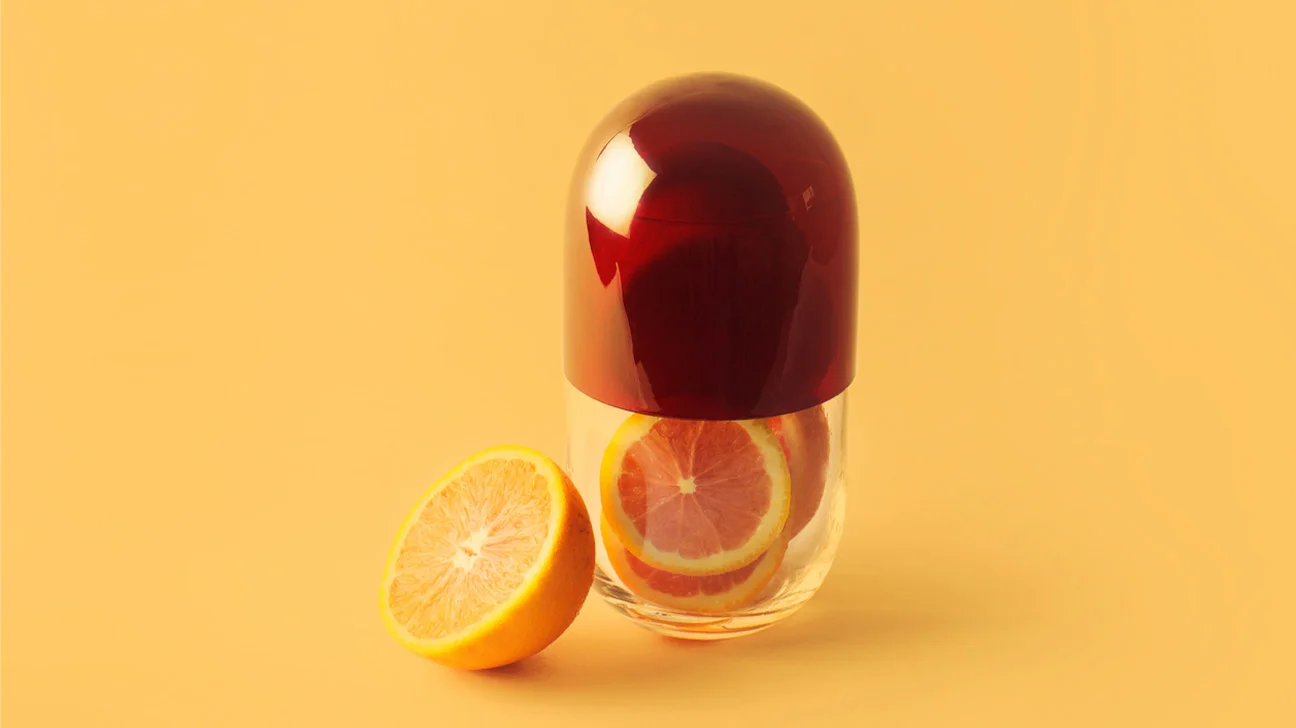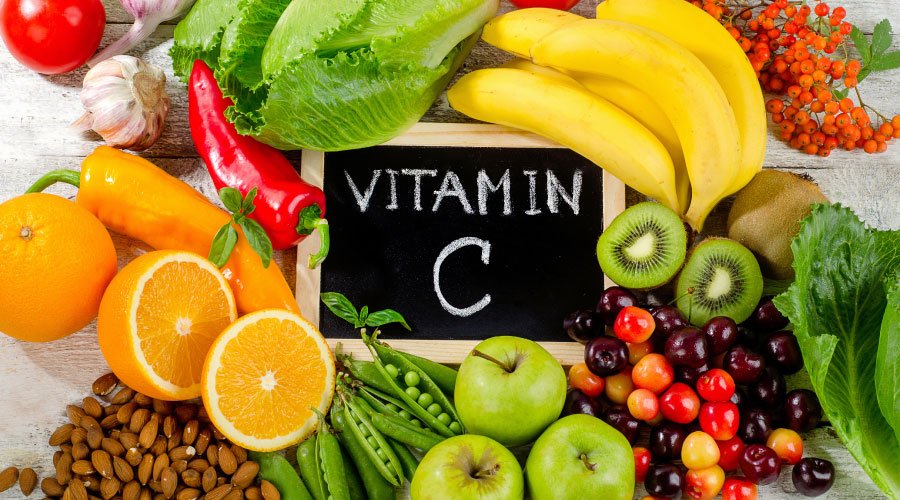Benefits of Vitamin C it is needed for the growth and repair of tissues in all parts of your body. It is used to: Form an important protein called collagen, used to make skin, tendons, ligaments, and blood vessels. It is strictly obtained through the dietary intake of fruits and vegetables. Citrus fruits, berries, tomatoes, potatoes, and green leafy vegetables are excellent sources of vitamin C.

Why we need vitamin C
Vitamin C is water soluble, and the body does not store it. To maintain adequate levels of vitamin C, people need to consume food that contains it every day.
- The body needs vitamin C for various functions. Here are some of them:
- It helps the body produce collagen, L-carnitine, and some neurotransmitters.
- As an antioxidant, it helps remove unwanted substances known as reactive oxidative species (ROS) from the body.
- It helps the body absorb iron.
- It boosts the immune system.
- It enhances wound healing.
ROS are substances such as free radicals that result from natural bodily processes, exposure to pollution, and other factors. They can lead to oxidative stress, which can, in turn, cause cell damage.
Vitamin C’s antioxidant activity may help reduce inflammation and lower the risk of developing various conditions, including some cancers.
The body needs vitamin C to produce collagen. This is the main component of connective tissue and makes up 1–2% of muscle tissue.
- Collagen is a vital component in fibrous tissues such as:
- Tendons.
- Ligaments.
- Skin.
- the cornea.
- Cartilage.
- Bones.
- the gut.
- blood vessels.
Low levels of vitamin C in the body can lead to scurvy. Symptoms of scurvy include swollen joints, bleeding gums and loose teeth, anemia, and tiredness.
Food Sources
- Fruits and vegetables are the best sources of this vitamin.
- Citrus (oranges, kiwi, lemon, grapefruit).
- Bell peppers.
- Strawberries.
- Tomatoes.
- cruciferous vegetables (broccoli, Brussels sprouts, cabbage, cauliflower).
- White potatoes.

Signs of Deficiency.
In developed countries, situations at greatest risk for deficiency include eating a diet restricted in fruits and vegetables, smoking or long-term exposure to secondhand smoke, and drug and alcohol abuse. The following are the most common signs of a deficiency.
- Scurvy, the hallmark disease of severe vitamin C deficiency, displays symptoms resulting from loss of collagen that weakens connective tissues:
- Skin spots caused by bleeding and bruising from broken blood vessels.
- Swelling or bleeding of gums, and eventual loss of teeth.
- Hair loss.
- Delayed healing of skin wounds.
- Fatigue, malaise.
- Iron-deficiency anemia due to decreased absorption of non-heme iron.
Benefits of Vitamin C on:
The benefits of vitamin C may include the following:
Wound healing
Vitamin C helps the body produce collagen and is present in skin, muscle, and other tissues.
People with a low intake of vitamin C may experience slower wound healing, as their bodies will be less able to produce collagen.
During times of recovery, healthcare professionals may recommend supplements for people with low vitamin C levels.
Cardiovascular health
- Vitamin C may benefit cardiovascular health for several reasons. Studies have suggested that it may:
- have antioxidant properties.
- help widen the blood vessels.
- improve nitric oxide production.
- help reduce plaque instability in atherosclerosis.
- This could help protect against heart disease and hypertension, or high blood pressure.

Cataracts and age-related macular degeneration
Vitamin C may help lower the risk of cataracts and slow the progression of age-related macular degeneration. However, more research is needed.
Experts believe that oxidative stress may be a factor in both conditions, so any benefit may be due to vitamin C’s antioxidant activity.
Diabetes
A 2019 study looked at 31 people aged around 60 years to see whether or not taking vitamin C supplements made a difference to their glucose levels after eating.
After taking supplements for 4 months, the participants’ glucose levels and blood pressure improved, compared with taking a placebo. This suggests that vitamin C could, one day, be a treatment for diabetes.
Anemia
Vitamin C enhances the absorption of iron, and some healthcare professionals recommend taking vitamin C supplements with iron tablets to improve absorption in people with iron deficiency anemia.
One 2020 study looked at 432 people who took iron supplements for iron deficiency anemia. Some took vitamin C with their iron supplement, and others did not.
However, both groups saw similar increases in iron, suggesting that vitamin C supplementation is unnecessary for this purpose.
Pollution
Air pollution consists of various substances and chemicals that can have a negative impact on people’s health.
Some research has suggested that a combination of vitamin C and vitamin E may have an antioxidant effect that can help reduce symptoms of asthma and chronic obstructive pulmonary disease.
Allergies
During an allergic reaction, the immune system triggers an inflammatory response that can lead to symptoms such as swelling and hives. During this process, the body produces ROS, which can lead to oxidative stress.
In a 2018 study , 71 people with skin or respiratory allergies received various doses of intravenous vitamin C, and the researchers observed the severity of the participants’ symptoms. Their paper concludes that taking a high dose of vitamin C may help reduce allergy symptoms.
They also found evidence to suggest that low vitamin C levels were common in people with allergies.

Sources of Vitamin C
The best sources of vitamin C are fresh fruits and vegetables. Heat and cooking in water can destroy some of the vitamin C content in these foods, so eating raw foods is best.
- Some good sources of vitamin C include:
- red and green peppers.
- oranges and orange juice.
- grapefruit.
- kiwifruit.
- strawberries.
- spinach and other green, leafy vegetables.
- tomatoes.
- potatoes.
- green peas.
Benefits of Vitamin c on Skin and Hair:
Benefits of Vitamin c on Skin
- There are plenty of benefits to using vitamin C on your skin. For example, vitamin C:
- is safe for most skin types.
- provides hydration.
- can brighten your skin.
- can reduce redness.
- can reduce hyperpigmentation.
- can reduce the appearance of under-eye circles.
- may protect against sun damage.
- may soothe sunburns.
- may help wound healing.

What Does Vitamin C Do for Your Skin?
- The benefits of Vitamin C on health and skin make it an important part of a skin care routine. Vitamin C can:
- Prevent effects of sun damage.
- Defend against hyperpigmentation.
- Stimulate collagen production.
- Improve skin’s texture and quality.
- Assist in the treatment of eczema.
- Which Vitamin Is Good for Face Glow?
- Vitamin C is the best vitamin for a glowing face. Our dermatologist in Delray Beach notes that Vitamin C is generally safe and gentle when included in skin care serums. It doesn’t come with intense heavy precautions and is one of the most effective vitamins for glowing skin.

Benefits of Vitamin C on Hairs:
Vitamin C Benefits for Hair
Aside from the incredible benefits of Vitamin C for your health and skin, it can also have a huge impact on your hair. Vitamin C benefits for your hair are from a necessary property within the vitamin that creates the protein, known by the more popular term, collagen. It promotes hair health, reduces hair loss, and improves hair growth. Vitamin C deficiency can also result in dry hair and split ends.
What Does Vitamin C Do for Your Hair?
- The benefits of Vitamin C on hair are why our dermatologist in Boca Raton recommends that you include it in your hair care routine. It can:
- Fight off dandruff.
- Prevent premature graying of hair.
- Combat against hair loss.
- Prevent hair from growing weak, brittle, and thin






 No products in the cart.
No products in the cart.